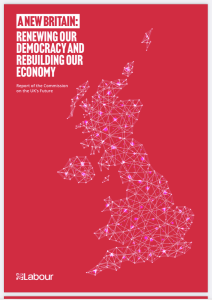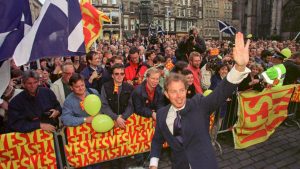Mike Small of bella caledonia has written this response to Gordon Brown’s report ‘A New Britain: Renewing our Democracy and Rebuilding our Economy’. He argues that this report collapses under the weight of its own incoherence. Instead of viewing this as a set of solutions for Scotland, it should be seen as Labour’s attempt to create a populist sovereignty for England. This is Labour’s Brexit. Allan Armstrong spoke for the Radical Independence Campaign at the demonstration called outside Holyrood, in response to the Supreme Court ruling. This article was also posted by bella caledonia.
1. GORDON BROWN’S NEW REPORT – THE SOLUTION?
Gordon and Arlene
Two new fronts have emerged in the past couple of weeks to quell the possibility of Scottish independence and quash the vile separatists. On the one hand (let’s say the right) Arlene Foster launched the “Together UK Foundation” in the Democratic Unionist stronghold of Kensington. Foster had the support of The Conservative Woman’s editor Kathy Gyngell who wrote (‘Arlene Foster’s inspirational move to keep the Kingdom United’):
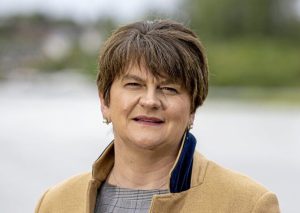
“Baroness Foster is a forceful woman but she is also a people person and diplomat. She stressed the ‘explicitly non-party political’ approach of the foundation – she almost didn’t have to. It was self-evident that she has already attracted a wide range of support from the range of guests present. White, Indian or black, they had one thing in common – they were pro-Union and felt and were proud to be British. They neither wanted to see that identity taken away from them, or their country diminished in the world and dropping to a third-rating state as must be the case were the United Kingdom broken up.”
In her article covering the launch Kathy Gyngell explained that Foster was said to hold a “particular brief against the Scottish National Party which she described as being just about anti-everything – anti-English, antisemitic, and anti-Indian”. The bizarre comments were never explained (and later deleted), though the presence of Neil LaL, chairman of the Indian Council of Scotland, may have something to do with it.
Baroness Foster’s imitative had previously been billed to be bolstered by a tour with Colonel Davidson. Back in August the Scottish Daily Express announced ‘Arlene Foster and Ruth Davidson to go on tour to battle Nicola Sturgeon and protect the union‘), explaining: “Sources close to the tour claimed that they were undertaking it in order to shift the limelight away from Scotland’s First Minister Nicola Sturgeon who has been courting media attention for the last month.”
Sadly these plans failed to materialise. You can follow the Together UK Foundation here.
A New Britain
On the other hand, the hotly awaited plans for constitutional reform by Gordon Brown have been announced. The grandly titled: ‘A New Britain: Renewing our Democracy and Rebuilding our Economy, Report of the Commission on the UK’s Future’ landed with a big clunky-fisted thump on Monday morning. Read it here.
Gordon Brown has been handing-down these chunky top-down sort of ‘commission/reports’ all of his life. It’s what he does.
The report is lengthy, design-lite, and has all the hallmarks of a New Labour re-tread, an attempt to sprinkle some Blair-Years magic onto Starmer’s uninspiring non-vision.
It’s a very strange document.
Before going into the detail of the actual proposals three oddities are worth noting. The first is the step-change for Labour. For years the message to those advocating constitutional change has been a variation of: “Nobody’s actually interested in the constitution .., what people really want to hear about is bread and butter issues …” (bla bla bla). Now, out of the blue, what’s REALLY of Number One importance is … the Constitution.
Second it’s really difficult to follow the democratic logic of this whole project. It’s a report that’s been squirreled away by Brown (and his team?) for years. It’s not – as far as we know – had any interaction with, you know, people. To this end it is the perfect Brown-Blair democracy project, handed-down from on high with all its Paternalistic Magnificence. It is Devolution from Above. It also seems very strange that it will be enacted via an election. So Labour utterly condemns the SNP’s proposed de facto referendum for constitutional change, but their counter is … a de facto referendum for constitutional change. These plans will go ahead even if utterly rejected by the Scottish people at the next election. This is astonishing brazen and completely undemocratic.
In some ways this follows the descent of Labour since the 1990s. 90s Labour under the doomed-duo of Blair and Brown were a highly electable force who rode the wave of popular constitutional change and shaped and nurtured it into a manageable project. Or so they thought. But these proposals do not have an underpinning of popular will, they do not have decades of campaigning for Home Rule, they do not have a cross-party Constitutional Convention, they do not have a mass civil-society consensus. Ian Murray is not Donald Dewar.
Starmer-Brown will be imagining one (or both of them) striding down the High Street, past St Gile’s surrounded by Meg Ryan-style Yes! Yes! Yes! banners as the masses reach a crescendo of approval for their reforms. This dear reader, is unlikely.
The New Britain document, indeed the entire project, is the dewy-eyed reminiscence of Brown in his twilight years, except in his dotage he’s forgotten the ‘democracy’ bit about democracy. It is like an echo of Brecht’s famous poem, The Solution:
After the uprising of the 17th June
The Secretary of the Writers Union
Had leaflets distributed in the Stalinallee
Stating that the people
Had forfeited the confidence of the government
And could win it back only
By redoubled efforts. Would it not be easier
In that case for the government
To dissolve the people
And elect another?
Third, despite all of the bluster from Labour’s solo MP, this isn’t really about Scotland at all. This is Labour’s Brexit. While the report scatters scraps of odd powers to the ‘nations and regions’ it has a strange absence at its very heart. The nation for which this document has really been prepared doesn’t appear in its pages. As Kirsty Hughes writes: “Somewhere missing in this is England as a whole. Brown’s report talks of a ‘Union of Nations’ but the strangely absent England remains the heart of power & dominance where Westminster still effectively acts as the UK and England’s government. It’s the shadowy elephant in the room…”
And yet, much of the report is aimed at English voters and based on English political innovations. In this respect it pretends that devolution hasn’t really happened, and certainly that the Better together campaign never did.
Chapter Eight: ‘Scotland, Wales and Northern Ireland in a Reformed United Kingdom’ doesn’t even mention England. It states: “Scotland, Wales and Northern Ireland each has its own unique position in the UK reflecting the different history and aspirations of each.” England just doesn’t exist.
There’s a reason for that, and there’s a reason for Brown’s forgetfulness about the ‘democracy bit’ of democracy. The reason is that there is no mandate for any of this, and his own leader has explicitly, and immediately explained that even if Scottish voters overwhelmingly reject these ideas they’ll get them anyway. I told you it was Labour’s Brexit.
Take. Back, Fucking. Control.
The reason England is the Macbeth/Voldemort of the drama is because to name such an entity would demand that you explain and confront some of the absurdities of Brown’s Federalism 3.0 – its asymmetry – its lack of democracy – its weird imposition of Mayoral style devolution – its doublespeak.
Some of the logic is torturous: Recommendation 19: Enhanced Local Control: There is a strong case for pushing power as close as possible to people in Scotland, and consideration should be given to establishing new forms of local and regional leadership, such as directly elected Mayors.
There is no mandate, political discussion of any of this in Scotland. Nor indeed, really in England. As Iain Macwhirter, appropriately re-located to The Spectator has it: “English voters are rightly suspicious of constitutional change. They have never supported federalism or even regional devolution. Labour abandoned it in 2004 after regional assemblies were decisively rejected by a referendum in the north east of England. It is not clear whether the English regions would be given another say though one suspects not. That would only fuel SNP demands for a repeat referendum.”
English nationalists also baulk at the prospect of devolution which they see as a form of balkanisation, an effort to undermine a nascent English state/nation. Of course Starmer-Brown & Co don’t mean to suppress that, they just endlessly conflate and confuse England-Britain which just emerges as the default setting, a universal and unexplained nation that sometimes pretends to be a Union.
Dispute all of the fanfare, the ridiculous build-up, when you look at the actual detail of ‘new powers for Scotland’, there’s very little there. As Adam Ramsay points out (‘Labour knows our democracy is broken. So why are its ‘reforms’ so weak?‘):
“The report proposes only limited new powers for Holyrood, mainly “a consultation over updating Scottish capital borrowing ceilings to account for changing economic circumstances. Any changes should retain the limits on what borrowing can be used for and be consistent with UK-wide fiscal rules”. But this is offset by a proposed new legal obligation for different UK governments to co-operate – potentially meaning Westminster could use the courts to force Holyrood to collaborate with whatever daft Daily Mail scheme it’s chasing after today, and fundamentally undermining the autonomy of the Scottish, Welsh and Northern Irish parliaments.”
In addition, the massively hyped ‘abolition of the House of Lords’ turns out to be no such thing.
Brown’s reports thunders: “The House of Lords in its present form is indefensible in principle. It still contains the last vestiges of the mediaeval estates of the realm, notably 92 hereditary peers representing the landowning classes. No justification can be made for their role in making the laws of the land. That is not however the most serious concern about the Lords. It has also become excessively large, having swollen in recent years to around 800 Peers – and now ranks as the second biggest parliamentary chamber in the world, after the National Peoples’ Congress in China.”
But their proposals for a second chamber are deeply problematic. As Macwhirter notes: “The Assembly of Nations and Regions would also install a raft of nationalist assembly persons in the upper house, which the SNP currently boycotts. English voters loathe the idea of Scots meddling in Westminster, which is why the Tories will no doubt seek to spin the Brown plan as providing a new platform for separatism.”
As Brown’s report states: “The present House of Lords is not geographically representative, and, despite the efforts of some members, does not look at issues from the perspective of the nations and regions of the UK.”
I mean, that’s kind of The Point. The UK is a deeply centralised state. It is Anglo-Britain. To be ‘geographically representative’ is to bring into the heart of the beast the very characters and issues that this report studiously avoids and ignores. You want to systematically deny a democratic vote in Scotland, then you want to say ‘come and join an ‘Assembly of Nations and Regions’ where you think those issues are juist going to melt away?
Asymmetry Inaction
At the very heart of this project is the same dilemma and contradiction that was pointed out by the Kilbrandon Commission in 1973. It’s repeated here. As Believe in Scotland notes: “This report once again presents federalism/devolution as an alternative to Scottish independence but this is a pipe dream. England has 84% of the UK population and federalism cannot work under these conditions.”
Nevermind England, as Plaid Cymru point out does it even map as something that has coherence across the other parts of the UK:
But the real reason none of this is landing well, is that Brown’s convenient constitutional dementia has consequences. Yesterday Brown was quoted saying: “The status quo is off the agenda, as far as Labour is concerned, we are the party of change in Scotland”.
But this party of change has one MP. One. And Sir Keir Starmer has already explained faithfully that these plans will be imposed on Scotland even if we reject them. That’s a grand plan for the Party of Change.
Brown’s report is excellent in outlining some of the key structural failures of Broken Britain. But its plans remain incoherent at best. They are what Tom Nairn would call ‘redemptive convulsions of that sort: new uniforms for the cadaver, as it were, preserving the tradition and spirit of congenital non-revolution.‘
The photograph that Starmer and Brown should be focusing on is not the ones of Brown and Blair resplendent as they bask in the glow of their 1990s devolution moment on the streets of the Old Town. The image they should be focusing on is the statue of Donald Dewar surrounded by protestors after the Supreme Court ruling. For Labour Scotland is the Land that Time Forgot. Their political amnesia has them forget the political price they have paid for their role in Better Together and allows them to assume good-faith, trust and belief in them. That doesn’t exist anymore, and neither does the Britain they are trying to resurrect.
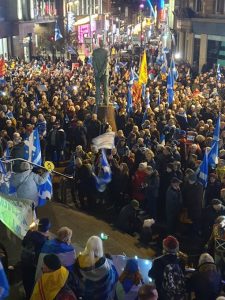
2. LET THE PEOPLE DECIDE
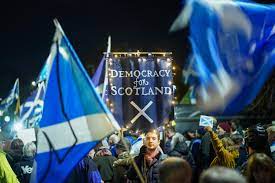
The Radical Independence Campaign organised a demonstration outside the Supreme Court in London on October 11th. It was well covered by the media, including The National and Daily Record in Scotland. We did not go down to London to press the Supreme Court to take a favourable stance on a new Scottish independence referendum. We thought that when it comes to the exercise of self-determination, the Supreme Court had no role to play and we called for ‘Let the People Decide’.
Today’s Supreme Court ruling has unwittingly reinforced this principle. It says only Westminster can decide. This is the political equivalent of telling a woman who wants to separate from her abusive partner that she has to get the permission of the in-laws first.
I would like to quote Scottish author, George Gunn in yesterday’s Bella Caledonia about the uselessness of depending on the UK state and its institutions to help us.
“A future for Scotland in a Tory run post-Brexit Britain will mean starving and malnourished children from Caithness to Carlops. Democracy will be reduced and eroded like a sea stack by the relentless surge of reactionary ideology. Corruption will become a way of life and race and gender crimes will increase like a virus. Illiteracy, social decay and destitution will afflict more and more people – daily, surprisingly, fatally. These are the real and overwhelming legacies of Tory rule. And increasingly it will be ruling as opposed to governing.”
The people of Scotland have been slower than the Irish and all peoples of the British empire to appreciate the fundamentally anti-democratic nature of the UK state. Part of this lies in the benefits a Scottish-British elite drew from these connections. But as the empire has gone into decline, so has the Union designed to back it up. The UK is not based on the sovereignty of the people but on the sovereignty of the Crown-in Westminster, backed by a whole host of anti-democratic Crown Powers and an unwritten constitution that allows its rulers to make it up as they go along. That is what we are seeing today with the Supreme Court ruling. And it was a Tory MP, Sir Geoffrey Nabarro, who best described the British legal system – “the best that money can buy”.
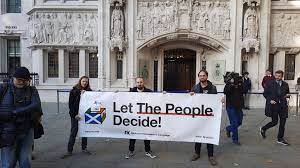
As slow learners we in Scotland have had to assess each of these UK institutions as they have impinged on us. Back in 1999, when the Scottish Parliament was set up, we were told that the UK is now based on the equality of four nations.
But the British Broadcasting Corporation did not change its name and thinking in 1999 to the 4 Nations Broadcasting Service? No, it remained very British. We saw this during the IndyRef1 campaign. The BBC gave Nigel Farage of UKIP with no councillors, MSPs or Scottish MPs, far more coverage than the Scottish Greens, with elected representatives. It posted regular briefings from the Far Right, whilst virtually ignoring RIC, which held conferences of 800, 1300 and then 3000. And I’m sure Nicola Sturgeon would agree that the way the BBC interviewed SNP spokespersons was very different from how they schmaltzed before Gordon Brown and Alistair Darling. And anyone who thinks the BBC is independent of the state needs only to look at its coverage of the death of Queen Elizabeth. North Korean TV could hardly have been more supine.
Back in 2014, The Guardian revealed the British High Command plans if Scotland had voted ‘Yes’. The area around Faslane and Coulport were to be detached from Scotland to form, in effect, the British West Clyde Territories. Another way of looking at this, would be to see these as Scotland’s Guantanamo or Guatanamac Bay. Jackie Baillie would probably have been made governor-general!
Therefore, following George Gunn’s advice, we should not be waiting for the Supreme Court, future Westminster elections or even Westminster’s devolved branch office, Holyrood. Holyrood cannot organise an independence referendum, because that requires local councils to organise the vote. These are nearly all headed by deeply unionist chief executives who will certainly not break the law.
Therefore, it falls on us, the people, to devise ways, to withdraw our support from the institutions of the UK state. So, which British institutions do we need to question? Not far from Holyrood is the UK government hub, Queen Elizabeth House. This Hub is not designed to give Scottish citizens any influence on those matters reserved for Westminster. Quite the opposite. It’s a UK government propaganda outlet, with the government wanting to curtail the Scottish Parliament’s powers. It’s BOSS – British Occupied Subject Scotland. We are capable of imagining and humorous ways of getting this across.
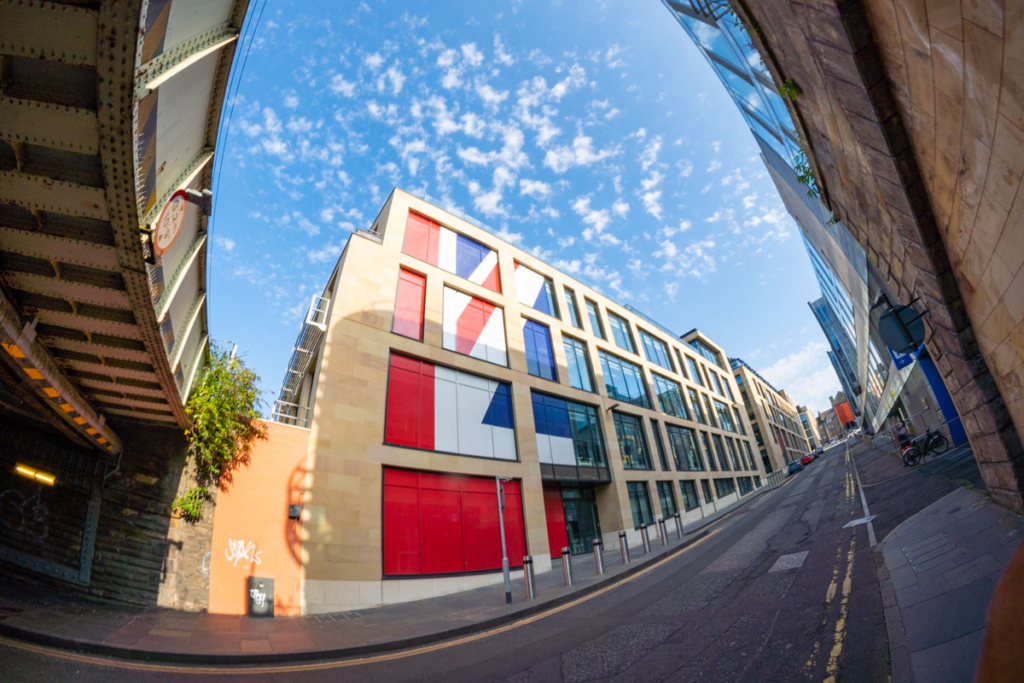
Next year we have Charlie’s coronation. Back in 2003, the queen, who had hardly been a supporter of Scottish self-determination, even in its limited devolutionary form, was called upon to open the new Scottish Parliament at Holyrood. It would have been far more fitting if those who had campaigned for this parliament, like Lesley Riddoch backed by the Proclaimers, had opened it.
Nevertheless, there was a well-attended and colourful protest on Calton Hill that day. And the democratic republican, Declaration of Calton Hill was proclaimed. Next year, on May 6th, Our Republic have booked Calton Hill for another protest event. Accepting any Charles III means accepting all the state’s Crown Powers and their long reach, as the evicted people of the Chagos Islands in the Indian Ocean well know.
And it’s no wonder the monarchy is so strongly supported by the Unionist Right. They royal family pay few taxes, can ignore laws covering workers’ pay and conditions, the protection of ethnic minorities and environmental rights, and they can privately lobby not only Westminster, but Holyrood too, to ensure their interests are promoted – a Brexiteers’ paradise!
RIC and others aim to make May 6th not just a fun day, but part of the Scottish people’s ongoing withdrawal of support from the institutions of the UK state. However, there is also a role for our elected representatives. Gwynedd council, in the heartland of Welsh-speaking Wales, has voted by 46 to 4, to call for the ending of the Prince of Wales. In Scotland independence supporters may be behind Ireland in challenging the UK state, but we do like to think we are the pacemakers for the Welsh. So, how can we do better than Gwynedd council?
It is to the credit if the SNP that they refuse to take part in the UK’s House of Lords. But there is another even more anti-democratic and secretive part of the Westminster set-up, and that is the Privy Council. Past and present Scottish First Ministers are members. However, they are banned from telling the Scottish people what goes on there. It was the Privy Council which Boris Johnson used to prorogue Westminster, supposedly the UK’s sovereign body. It has the powers to topple governments. If Nicola Sturgeon was to withdraw her participation, that would be a powerful indicator that Scotland was serious in wanting to create a new democratic order.
In a democracy, sovereignty lies with people, that is the essence of republicanism, not whether or not there is an unelected head of state.
There was nothing democratic about the election of Donald Trump in 2016. He came second in the vote. And US corporations are given massive political and legal rights, as if they are people. There is nothing democratic about Putin’s Russian Federation that is run for the benefit of an oligarchy of kleptocrats. There is nothing democratic about XI Jinping and his one-party dictatorship in China. These are all republics, but none are based on the democratic principle of the sovereignty of the people.
The UK state victory in 2014 turned out to be pyrrhic and the Unionists know that. The issue of Scottish independence became mainstreamed, as all subsequent election results have shown. When it came to Brexit, the rules were very different. The overall ’No’ result was only achieved by excluding 16-18 year olds and most EU residents, all of whom had been given the vote in IndyRef2. An ethnically-based franchise for British subjects, which bolstered the Hard and Far Right’s ‘Project Hate’ was their answer to the Scotland’s civic national franchise looking to maximise the number of citizens. In 2019 the Scottish Parliament voted to extend the franchise to even more people. Meanwhile Westminster is looking to ways to further restrict the franchise. Hopefully the bill recognising transgender self-determination will soon go through Holyrood. Meanwhile every form of social reaction – transphobia, homophobia, misogyny and national chauvinism are growing at Westminster every day. We had an amazing rainbow alliance in 2014 and we need to remain Scots, united in our diversity,
And lastly, RIC’s ‘Let the People Decide’ ballot box has Scottish, Welsh and Irish flags on its sides. The former British colonies of Bahamas, Barbados, Jamaica., Grenada, Antigua and Barbuda and St Kitts-Nevis are also voting to become republics. Many of their descendants migrated to the UK, where they have recently become victims of such scandals as Windrush and Grenfell Towers. Just as the banksters are being compensated today for their 2008 Crash, which has created millions of victims, so the slaveowners were compensated from 1833 to 2016 for their slaves’ emancipation. Therefore, we are not alone in wanting to challenge the British political and social order. We can unite on the basis of our ‘Internationalism from Below’ so ‘Let the Peoples of these Islands Decide’.
26.11.22
___________
also see:-
The reign of Elizabrit – 70 years of imperialist and unionist violence – Allan Armstrong, RCF

